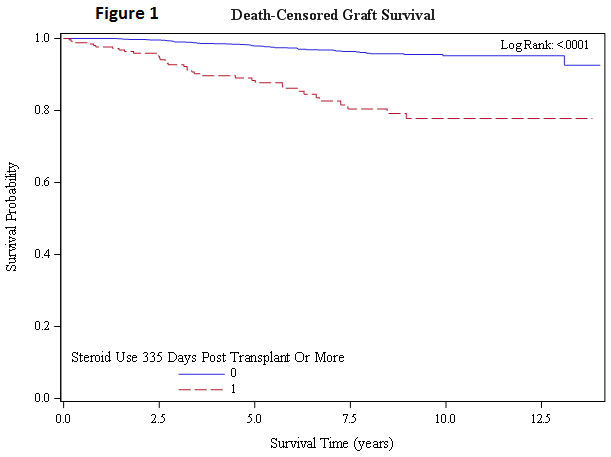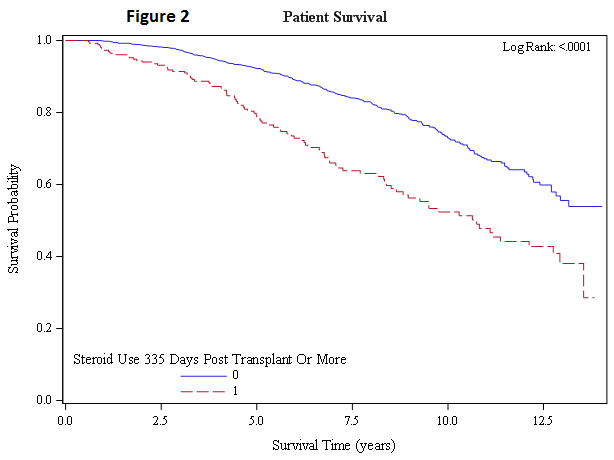Steroid Dependence at 1 Yr in Kidney Transplant Recipients Initiated on Early Steroid Withdrawal Protocol: Associated Risk Factors and Prognosis
Indiana University, Indianapolis, IN
Meeting: 2020 American Transplant Congress
Abstract number: B-109
Keywords: Glucocortocoids, Graft failure, Graft survival
Session Information
Session Name: Poster Session B: Kidney Immunosuppression: Novel Regimens and Drug Minimization
Session Type: Poster Session
Date: Saturday, May 30, 2020
Session Time: 3:15pm-4:00pm
 Presentation Time: 3:30pm-4:00pm
Presentation Time: 3:30pm-4:00pm
Location: Virtual
*Purpose: Early steroid withdrawal (ESW) has become a stable immunosuppression regimen in the USA with a third of patients now discharged steroid-free immediately post-transplant. However, there is significant scarcity in clinical data that identifies patients at risk of failing ESW protocol as well as describes the clinical impact of chronic steroid dependence in such patients compared to those who were successfully weaned off the steroid.
*Methods: A retrospective chart review of kidney transplant recipients at Indiana University Transplant between 2005 and 2016 was done. Patients with multi-organ transplant, follow up time < 1 year, or primary kidney transplant failure were excluded from the analysis. All patients received anti-thymocyte globulin as well as a pulse steroid induction regimen except for those with 0 antigen mismatch who received basiliximab induction. Patients were chronically placed on 2 immunosuppression medication regimens once weaned off the steroid.
*Results: A total of 1991 patients (1723 with successful ESW vs 268 Steroid dependents at 1 year) were included. Patients dependent on steroids at 1 year were significantly likely to be younger (<40 y/o), AA race, have prior transplant history, cPRA > 50%, positive flow cytometry crossmatch and recipients of a deceased kidney transplant. Compared to those successfully weaned off the steroid, steroid dependence at 1 year was significantly associated with worse first year acute rejection (37% vs 12%, p<0.0001), 5 year mean GFR (46 vs. 56 ml/min ), 5-year DCGS (89% vs 97.7%, p<0.0001,figure 1 ) and 5-year patient survival (85% vs 90%, p<0.0001,figure2 ). Steroid dependence at 1 year is associated with a larger hazard for DCGS and patient's survival (hazard ratios: 5.57 & 2.15, p<0.0001) compared to those weaned.
*Conclusions: Steroid dependence at 1 year in recipients who failed ESW protocol appears to be an independent risk factor for worse kidney allograft and patient outcome in the intermediate-term. Early identification of kidney transplant recipients on ESW protocol with increased risk for steroid-dependence may help guide modification of immunosuppressive regimen as it may be appropriate to reduce the worse outcome.
To cite this abstract in AMA style:
Yaqub M, Mishler D, Taber T, Sharfuddin A, Goggins W, Adebiyi O. Steroid Dependence at 1 Yr in Kidney Transplant Recipients Initiated on Early Steroid Withdrawal Protocol: Associated Risk Factors and Prognosis [abstract]. Am J Transplant. 2020; 20 (suppl 3). https://atcmeetingabstracts.com/abstract/steroid-dependence-at-1-yr-in-kidney-transplant-recipients-initiated-on-early-steroid-withdrawal-protocol-associated-risk-factors-and-prognosis/. Accessed February 19, 2026.« Back to 2020 American Transplant Congress


